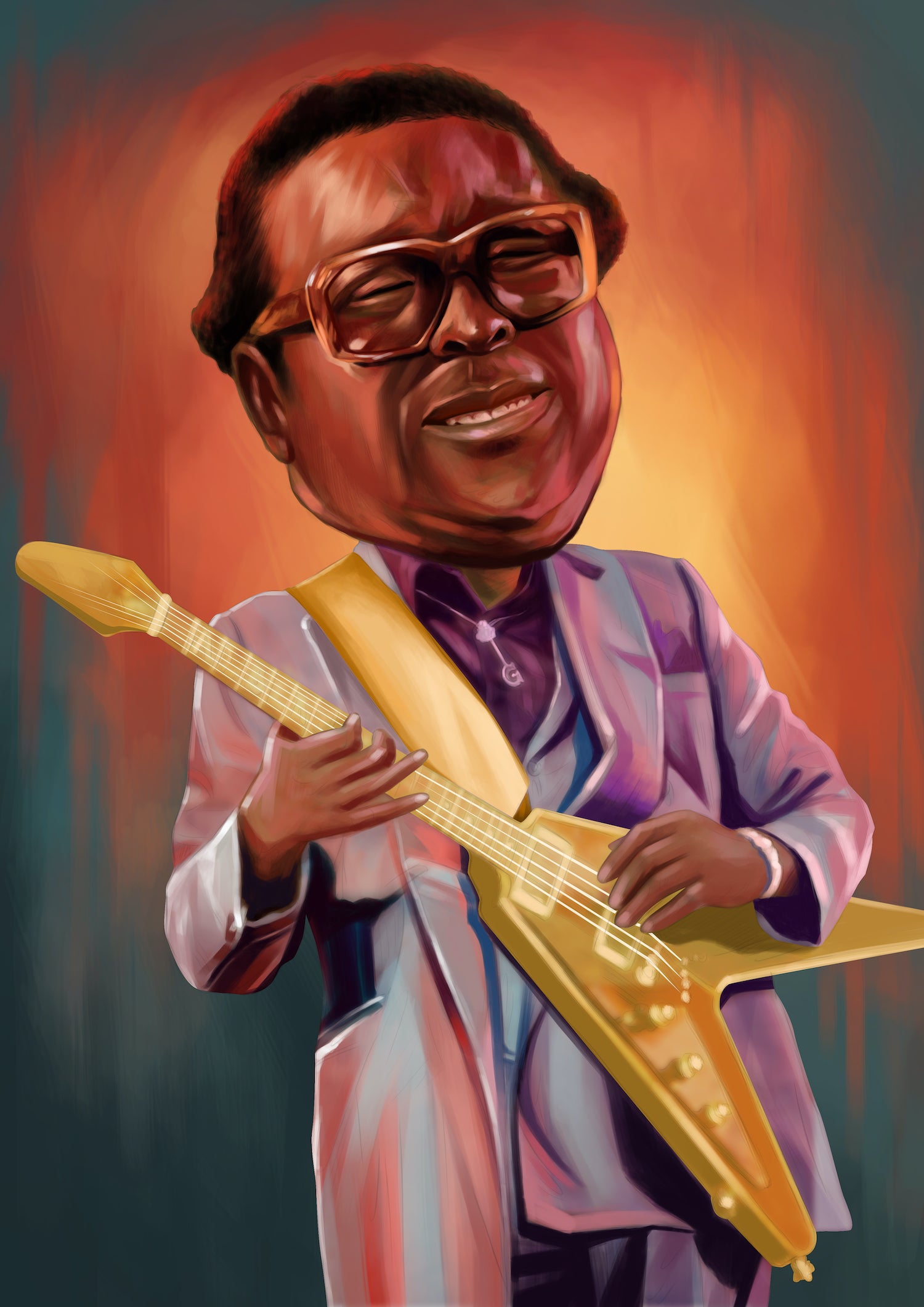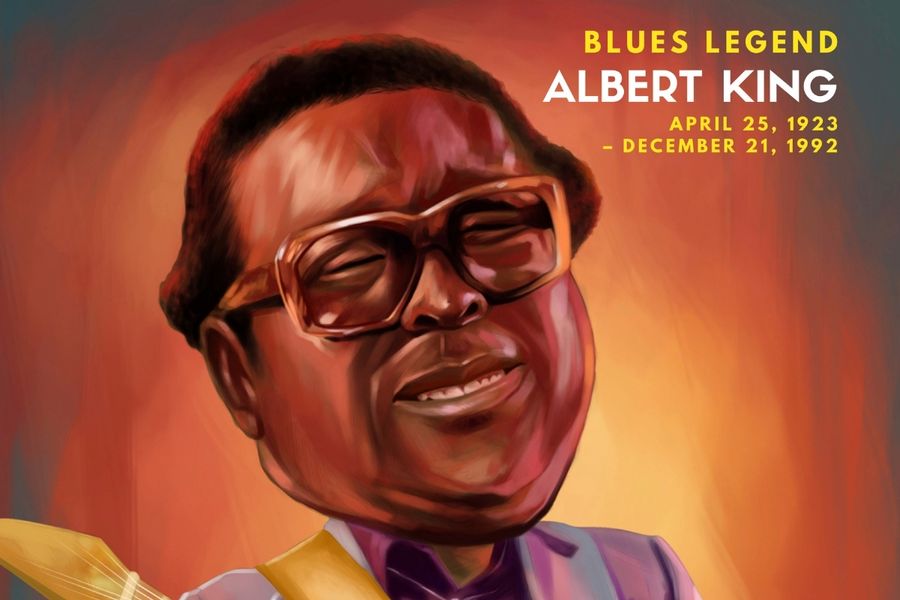Elvis Presley has always been called the King of Rock n’ Roll. However, the title of “King of the Blues” goes to Albert King, an Axe legend guitarist who was perhaps the best-known blues guitarist of the 20th century.
Albert inspired modern instrumental guitar music. He wasn’t just an inspiration to other African American blues musicians like Robert Cray and Otis Rush. He was also an inspiration to white blues musicians like Stevie Ray Vaughan and Eric Clapton. Albert created his own style and tone of blues music that no other musician could duplicate.
“Born Under a Bad Sign” is Albert’s best-known blues album. It features 11 blues song recordings throughout 5 different sessions. When the album first came out in 1967, it didn’t rank in any notable music charts. But as more people have listened to the album over the years, it is now considered one of the best blues albums ever recorded.

Music Style
Albert was a left-handed guitar player on a right-handed guitar setup. He basically pulled the guitar strings upside-down, which would explain why the tone of his guitar-playing sounded so much different. His eventual iconic guitar choice? A Flying V, played upside-down. The resulting sounds were dramatic, emotional, and spiritual all at the same time. Many other guitarists tried to imitate his dramatic guitar style, but they never came close to mimicking Albert’s talent and excellence.
Life and Career
On April 25th, 1923, Albert was born in Indianola, Mississippi, on a cotton plantation under the birth name Albert Nelson. His family soon moved to Forrest City, Arkansas and participated in a gospel group at their local church. He would eventually sing at the church while his father played the guitar. But his father left the family before he could teach him how to play the guitar.
Albert was self-taught, and built his first guitar using an old cigar box. He continued to play gospel at the church until he decided to focus on blues music solely. People noticed his unique style of playing the guitar from the beginning. When Albert got older, he brought his talent into several nightclubs throughout the Arkansas area.
Musicians knew his name was Albert Nelson. But as Albert became more eager to make a name for himself, he started promoting himself under the stage name “Albert King.” It was an effort to look like he was related to B.B. King, who was a more famous Blues musician at the time. Albert told people he was his brother, though he was not actually related in any way.
In the 1950s, Albert became a professional musician after joining the Groove Boys group. This opportunity exposed him to several other blues artists, such as Robert Nighthawk and Elmore James. He moved around a lot during the 1950s, first to Gary, Indiana, and then to Brooklyn, Illinois.
Albert’s first single record was “Bad Luck Blues” for Parrot Records in Gary. Unfortunately, the single record did not generate very many sales. He continued to record songs and perform with notable artists in nightclubs like Chuck Berry and Ike Turner. After Albert recorded the song “Don’t Throw Your Love on Me So Strong” with Ike Turner, it landed on the Billboard R&B chart at number 14.
The 1960s and 1970s were not much better for Albert either. Although he continued to get record deals and give live performances around the country, nothing ever gained him colossal notoriety. Albert went from one record label to another to record songs and albums. To his disappointment, the number of sales was less than satisfying.
It wasn’t until the 1980s that everything turned around for him. Now in his 50s, Albert would record the album “San Francisco ‘83” for Fantasy Records. It would earn him his first Grammy Award nomination and the opportunity to record a studio television session in Canada. That was followed by a second Grammy Award nomination for his next album, “I’m in a Phone Booth, Baby”, in 1984.
Albert had health problems and considered retiring, but he couldn’t walk away from his newfound fame. He went on nationwide tours and performed live at blues festivals for the rest of the decade. On December 21st, 1992, Albert died of a heart attack at his home in Memphis, Tennessee. His death came just two days after he played his last concert in Los Angeles, California.
Albert’s death prompted critics and blues fans to re-evaluate his work. They grew to appreciate his music a lot more after his death than they did during his life. Now he has officially achieved legendary status in the music world.
Awards and Accolades
Albert was the recipient of two Grammy Award nominations. The first nomination came for his work on the album “San Francisco ‘83” under the category of Best Traditional Blues Album. His second nomination came one year later for his next album, “I’m In A Phone Booth, Baby.”
In 1983, Albert was given the honour of getting inducted into the prestigious Blues Hall of Fame. He shared the honour with other blues inductees, including Louis Jordan, Robert Nighthawk, Ma Rainey, and Big Joe Turner. Ten years later, in 1993, Albert was given a star on the Walk of Fame in St. Louis, Missouri.
Albert never got to live long enough to see his induction into the legendary Rock and Roll Hall of Fame in 2013. He joined the ranks of the great legends like James Brown, Ray Charles, Fats Domino, Buddy Holly, Jerry Lee Lewis, and Elvis Presley.
Check out the new Axe Legend Albert King set!



